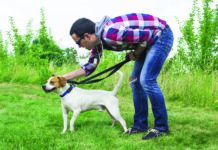Often it’s a puppy who’s overly insecure around her owners, but it can happen with adult dogs, too. The pet will scrape and bow and prostate herself on the floor to show she’s the lowly one and doesn’t mean any trouble. Such behavior is problematic in its own right, of course, but what can have consequences beyond emotional ones is submissive urination, say, when you come through the door at the end of the day. Submissive urination can also be stimulated by people arguing in the household, scolding, loud noises — even greetings that are too affectionate. The dog may run around with urine dribbling this way and that — that’s called excited urination.
A submissive dog is not being bad when she urinates indoors (even though many an owner believe that’s what’s going on and make the problem worse by yelling at their pet). It’s a reaction a scared dog simply can’t suppress. If you get angry, it only makes the problem worse because it sends a message to the dog that she didn’t exhibit her submissiveness well enough. She might soak the floor — or the rug — even more in response.
Many puppies stop the behavior on their own by the time they reach the age of one. They gain in confidence and lose their juvenile indoor piddling. But not all.
How to move things along for an overly deferent dog, whether puppy or adult?
First, do all the things you would do for an overly submissive dog in general. Treat her very kindly, let her sit on high places like the couch or the bed, make sure she wins tugs of war, don’t talk harshly or argue in front of her, and so on.
But in addition, because submissive urination tends to happen when owners come in from outside rather than from the next room, when you come home, do not talk to your dog, especially if you have a deep or gruff voice. Submissive dogs tend to view communication of any sort as a kind of threat, or challenge.
In addition, do not look directly into your dog’s eyes upon your return. And do not walk straight toward her. Instead, walk past her in a banana-shaped path, a curved trajectory. That will not make her feel bad. It will let her know that you don’t mean any trouble.
Then, sit down so you’re lower to the ground — and ignore your dog for a bit. Again, you’re not being cruel. You’re allowing your excessively anxious pet to regroup. She won’t feel as threatened by you and will be less inclined to urinate inappropriately.
Some submissive dogs urinate prematurely when it’s time to be walked because their owners have to reach for their scruff to attach the lead. If that’s the case with your dog, always leave a training lead on her in the house or apartment to avoid the need to reach down and touch the nape of her neck, which is such a sensitive area for our canine friends. That does away with an unnecessary challenge prior to taking her outside. (Training leads are loopless, so they won’t get tangled in the furniture and potentially choke the dog.)
When it is time to take your dog out, crouch down low to pick up the leash. Furthermore, don’t look straight at her, and speak in as high a voice as possible, no matter how unnatural that might feel. That will let her know that she does not have to grovel. One man who came to see us at the Tufts Animal Behavior Clinic had a cocker spaniel who was so afraid of him that we devised a system whereby he crouch-walked backwards toward his pet when it was time to take her outside and caught the training lead by feel.
It worked. The dog came to understand that the man meant well by her, and the two went on to develop a great relationship.




